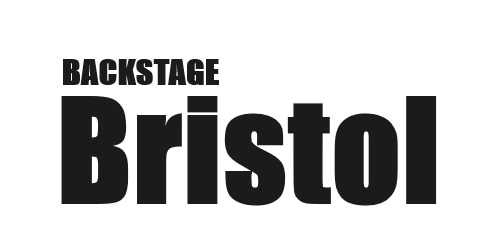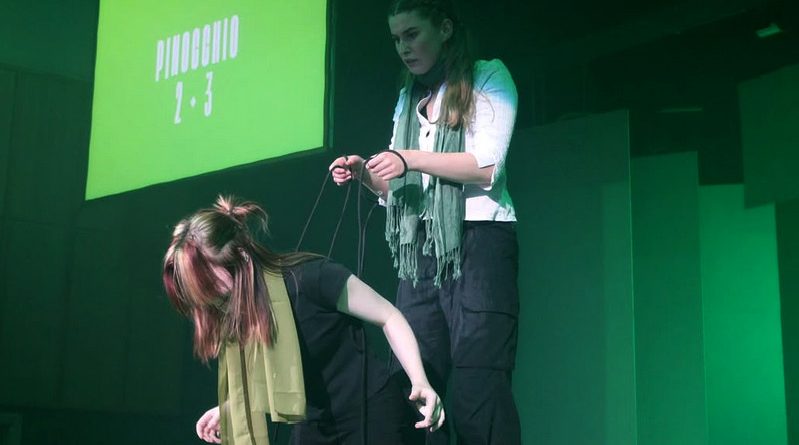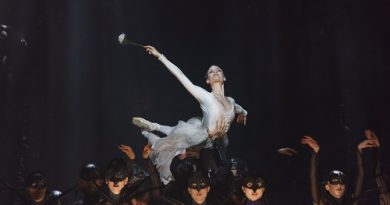Review: Immersion Therapy at The Winston Theatre
Daring piece of theatre taking audiences down the rabbit hole
Entering the Winston Theatre for Immersion Therapy feels like stepping into a dream world.
We are greeted by what appears to be two sales people – Voice One and Voice Two. Their fixed corporate smiles a mask. It feels familiar yet is nightmarish. They run the seven-step Immersion Therapy programme that we are about to witness.
The subjects for ‘immersion therapy’ are already sat amongst us in the audience. They are one of us, baffled at being called up.They are assigned a participant number, with the process falling somewhere between The Price is Right and Squid Game.
The show blurs the line between reality and fantasy. Between each stage of therapy, the participants discuss events and at times even speak directly to the audience. But during immersion therapy it’s back down the rabbit hole again.
It feels like a head-spinning horror. That’s not to say there’s no humour because it is at times quite funny.
Ollie Binnie’s writing is very daring. It’s 1.5 hours performed almost entirely in verse drama. At times it feels Shakespearean. Then the ensemble coming back together takes us into the realms of Greek drama.
The physical theatre, directed by Izzy How, Ivo Burton Franklin and Jess Edwards is sharp and marionette like, emphasizing a lack of personal control.
It’s also very self aware. After one speech, a participant turns to the audience asking “bit pretentious?”
At the end another alludes “the audience thinks it’s all about heartbreak.”
The writing is very much about relationship break ups, the loss one feels and the need for closure. But the prescriptive much quoted ‘seven stages of grief’ feels deliberately inauthentic and contrived within this context.
The final result which should make us feel alright just makes us feel all wrong, teetering on the edge of an dystopian revelation to come.
This lack of control emphasied by the intermittent appearances of Voice One and Voice Two with their fixed smiles break the illusion that there is anything natural about the process.
The theme of behaviour modification is echoed in background musical choices. Most particularly the juxtaposition between classical music and violence, control or manipulation.
The appearances of Voice One and Voice Two are usually accompanied with Muzak. In the mid twentieth century, Muzak was used for Stimulus Progression in workplaces, with the tempo and pace designed to affect the productivity of employees.
Similar juxtapositions of classical music with unease, violence, control and behaviour modification were found in Anthony Burgess’ A Clockwork Orange. The novel was published at the start of the 60s when Muzak went into decline amidst the rise of youth culture.
More recently, the same effect was achieved with Squid Game’s use of Haydn’s Trumpet Concerto (3rd Movement) and fairytale design belying themes of violence and control.
Immersion Therapy’s production is also quite daring. Blood is flung by hand from a bucket. A bath of water is used on stage. Two people take a shower. The ‘black’ stage of ‘therapy’ is performed in a blackout with just torches yet there is significant movement around the stage and auditorium.
Eli Grundy’s set design is multi-leveled boxes colour drenched in white. It feels clean and almost clinical in its simplicity, yet gives a sense of operatic drama.
The white set combined with the lighting design from head of lighting Bryn Fergusson, brings dramatic shifts with a different colour representing each of the seven stages: Shock, denial, anger, bargaining, depression, testing and acceptance. It’s all visually quite stunning.
Immersion Therapy is an interesting piece of theatre. There’s a lot to unpack from the audience’s perspective. And just when you think you’ve got there, it disappears like smoke.
The production is an original piece of theatre that’s written, produced, staged and acted by The University of Bristol’s Student-Writing Theatre Society.
Very impressive.
Immersion Therapy is at The Winston Theatre from 12 -15 November 2025
For more information or to book, visit: https://uobtheatre.com/production/immersion-therapy
Cast and Creatives
Participant 1 – Stella Page
Participant 2 – Beth Griffiths
Participant 3 – Matt Beavan
Participant 4 – Laurence Wood
Participant 5 – Bea Thomas
Participant 6 – Amelie Pichilingi
Participant 7 – Will Smith
Participant 8 – Molly Parnell
Participant 9 – Izzy Westerman
Participant 10 – Jasmine Procter-Tarabanov
Participant 11 – Elle Crosby
Participant 12 – Alice Lewis
Participant 13 – Marina Tadros
Participant 14 – Kara Molloy
Voice – Zaara Chadda
Voice – Charlie Warwick
Writer – Ollie Binnie
Co-Director Babs Marles
Co-Director – Ollie Binnie
Assistant Director – Mery Sutherland
Shadow Director Oli Pung
Producer – Charlie Shaw
Assistant Producer – Scarlett Swinney
General Assistant – Hannah Davenport
Sound Designer – Charles Hubbard
Movement Directors – Izzy How, Ivo Burton Franklin and Jess Edwards
Costume Designer – Phia Jones
Set Designer – Eli Grundy
Head of Lighting – Bryn Fergusson
Show Photography – Emma Conway
Poster and Programme Design – Florence Green
Brand Management – Alice Lewis
Featured Image: Emma Conway
Home: https://backstagebristol.com/
Bluesky: https://bsky.app/profile/chopsybristol.bsky.social
TikTok: www.tiktok.com/@chopsybristoltt
Facebook: https://www.facebook.com/backstagebristol
YouTube: https://www.youtube.com/user/chopsybaby




